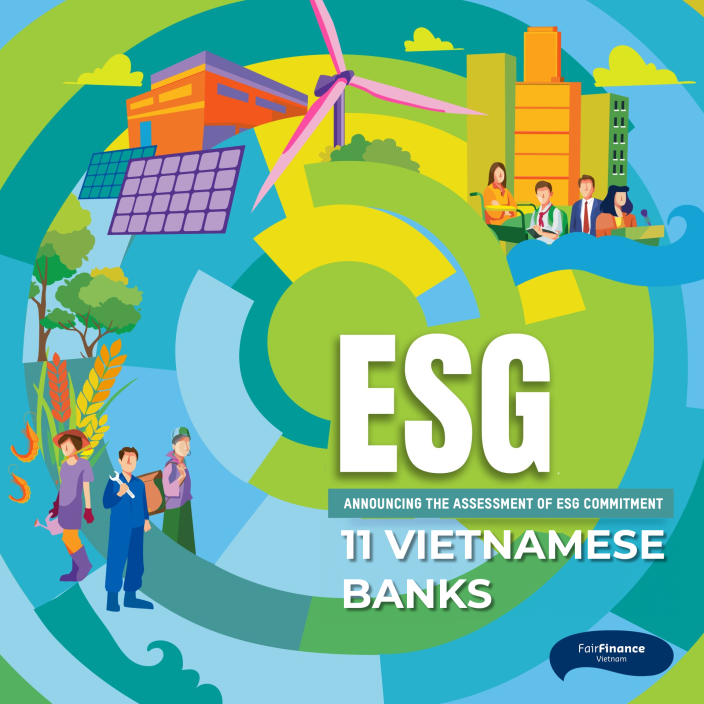The latest assessment report Initial Progress towards Sustainability by the Fair Finance Initiative Vietnam sheds light on the progress of Vietnamese commercial banks in their ESG commitments (E - Environment, S - Social, G - Governance). These commitments, strategically embedded within their documents and policies, signify a deliberate shift toward a green and equitable financial landscape.
These ESG commitments have been openly addressed by the banks in their documents and policies. All three E, S, and G themes have shown improvements. Notably, commitment to governance (G) has seen the most significant changes, with all banks publicly sharing policies related to Anti-Corruption, Customer Protection, Taxation, Transparency, and Accountability at various levels.
Here are some positive examples:
- VP Bank: In 2022, VP Bank unveiled comprehensive financial climate-related information (TCFD). Their disclosure spanned governance, strategic considerations, risk management, and quantifiable indices and targets. Moreover, VP Bank’s Green Lending Framework (GLF) outlines a robust process for deploying and managing green capital in project financing, while also excluding credit issuance associated with environmental and social risks.
- Agribank: Diversifying capital channels, bolstering comprehensive financial services, and enhancing financial access in rural and agricultural domains, Agribank contributes actively to mitigating the specter of “black credit.”
- HDBank: Demonstrating a commitment to sustainable development, HDBank invests in renewable energy. Their participation in clean energy projects—such as solar and wind power—contributes to carbon reduction and promotes alternative energy sources.
- Vietcombank: Noteworthy for its prowess in the social (S) sphere, Vietcombank implements programs that support education and community development. These initiatives elevate quality of life and bridge gaps in underserved areas.
- Techcombank: Standing out with transparent governance policies and unwavering responsibility, Techcombank fortifies its anti-corruption measures and safeguards customer and shareholder rights. Their internal regulations undergo reinforcement, and transaction transparency becomes paramount.
Despite improvements since the initial study Towards Sustainable Finance Subtitle Environmental, Social and Governance Commitments in the Banking Industry in 2020, Vietnamese NHTMs are still in the early stages of the "race to the top." Reasons include the lack of mandatory requirements from the government and limited pressure from customers who may not fully understand the banks' impact on these issues or the specifics of ESG commitments and implementation.
The report recommends that NHTMs and government agencies seek input from the community, social organizations, and experts during the formulation of ESG-related policies. The State Bank of Vietnam could establish a common ESG standard for commercial banks based on international conventions, encouraging ESG integration into core operations for a sustainable and responsible financial system.
This report arrives at a pivotal time when Vietnam is increasingly committed to international agreements and policies focused on green growth. The ESG factor within the financial industry takes center stage. Notably, this marks the second time the Fair Finance Vietnam initiative has conducted research on ESG commitments by Vietnamese commercial banks. The initiative aims to propel commercial banks and financial institutions toward applying ESG criteria in sustainable investment activities and fulfilling their responsibilities.
